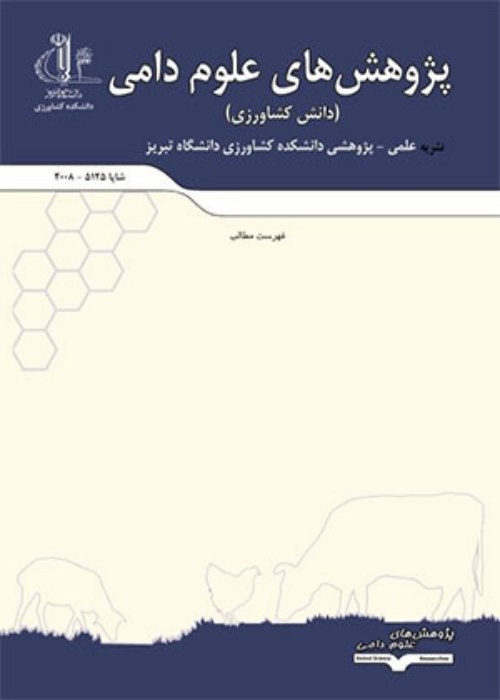Effect of fermented Saccharomyces cerevisiae supplements on performance and immune responses of broilers
Fermented Saccharomyces cerevisiae are used as a new additive in animals (Heidarieh et al., 2013). These products contain nucleic acids, chitin, beta-glucan and mannoligosaccharides. Researchers reported that feeding by Saccharomyces cerevisiae improves, improves growth performance in broilers (Baurhoo et al., 2006). Consumption of fermented Saccharomyces cerevisiae in rainbow trout, increased feed uptake and improved feed conversion ratio (Heidarieh et al., 2013). Due to the aforementioned effects of fermented Saccharomyces cerevisiae and insufficient reports on its use in broilers, the aim of this study was to investigate its effect on growth performance and immune responses.
An experiment was conducted as a completely randomized design using 240 day-old chicks (mixed sex) with four treatments, five replicates, and 12 chicks in each replicate from 1 to 42 days of age. Experimental treatments were included: (1) control group (basal diet without any feed additive), (2) basal diet+ 0.1 percent fermented Saccharomyces cerevisiae (3) basal diet + 0.3 percent fermented Saccharomyces cerevisiae and (4) basal diet + 0.5 percent fermented Saccharomyces cerevisiae.Chicks in each replicate were weighed weekly and feed intake was determined at the end of each week. From these data, average daily weight gain, average daily feed intake and feed conversion ratio were calculated. On day 42 of experiment, two birds (one male and one female) from each replicate were selected, weighed, then slaughtered and carcass yield and carcass components including breast, thighs, wings, abdominal fat, thymus and bursa of Fabricius were weighed using a digital scale and their relative weights to body weight were calculated.In order to assess the systemic antibody response, chicks were immunized by intramuscular injection of 0.1 mL of 25 % sheep red blood cell (SRBC) in PBS on days 8 and 22. Blood samples were collected from two birds of each replicate via the wing vein and serum antibody levels produced in response to SRBC were measured on days 21, 28, 35 and 42 (Salehimanesh et al., 2015). Skin response to intradermal injection of Phytohemagglutinin-P (PHA-P) was measured on day 16 during 24 and 48 h after injection (Grasman, 2010). Data were analyzed using the GLM procedure of SAS (SAS Institute, 2001) in a completely randomized design and means were compared using Tukey’s multiple range test at P<0.05.
The results indicated that treatments had no significant effect on daily feed intake (P>0.05) but daily weight gain and feed conversion ratio improved in all groups receiving fermented Saccharomyces cerevisiae (P<0.05). The beneficial effects of Saccharomyces boulardii and Bacillus cereus (Gil et al., 2005) and prebiotic (Fermacto) (Rodrigues et al., 2005) on broiler performance have been identified. It was reported that the use of probiotics (Primalac and Bacillus amyloliquefaciens) did not effect on daily feed intake (Yakhkeshi et al., 2012). In contrast, the use of lactobacillus reduced the daily feed intake of broilers (Murry et al., 2006). The difference can be due to the type and dose of the probiotic. By examining the effects of Saccharomyces cerevisiae and Bacillus subtilis on broiler performance, it was found that the probiotics increase growth performance, feed intake, and feed conversion ratio (Chen et al., 2009). It was reported that the use of 1.5 and 2% Saccharomyces cerevisiae (Sc47) in the diet of broiler chickens increased daily weight gain (Ghasemi et al., 2006). It was reported that addition of probiotic (containing Bacillus subtilis) in broiler chickens, improved the feed conversion ratio from 21 to 42 days of age (Fritts and Waldroup, 2003). In a study performed on broiler chickens fed mannanoligosaccharide (isolated from the cell wall of Saccharomyces cerevisiae), it was found that the feed conversion ratio was significantly reduced compared to chickens fed a mixture of probiotics and organic acids (Derebasi and Demir, 2004). Saccharomyces cerevisiae improves feed intake by stimulating beneficial microbes in the digestive tract (Kocher et al., 2004).The results indicated that treatments did not affected on carcass efficiency, breast, thigh and wing (P<0.05). All amounts of fermented Saccharomyces cerevisiae increased bursa of Fabricius and thymus weight ratio (P<0.05). Consumption of 0.1 and 0.3% fermented Saccharomyces cerevisiae reduced abdominal fat weight ratio (P<0.05). Feeding broilers with three diets, including probiotics of Primalac, Saccharomyces cerevisiae, and Aspergillus oryzae under heat stress, indicated that the weight of carcasses decreased, which could be due to their lack of effect under stress condition (Yaghoobfar et al., 2009). Researches indicated that consumption of lactobacillus reduces abdominal fat in broilers (Kalavathy et al., 2003). A study on the effect of probiotic (Lactobacillus) and synbiotic (Biomin) indicated that the spleen and thymus weight in the chicks consumed probiotic increased at 35 days compared to the group consumed synbiotic , but the weight of the bursa of Fabricius was not changed. According to the results of this study probiotics can affect the organs of the immune system, but their effect can vary, depending on the bacterial strain and the age of the bird (Awad et al., 2009). Non-significant changes for total anti-SRBC, IgG and IgM were observed on day 21 (P>0.05). Administration of 0.3% fermented Saccharomyces cerevisiae increased the total anti-SRBC and IgM on day 28 (P<0.05). Treatments increased total anti-SRBC, 0.3 and 0.5% fermented Saccharomyces cerevisiae increased IgG and 0.1 and 0.3%, increased IgM on day 35 (P<0.05). Total anti-SRBC was increased by 0.3 and 0.5% fermented Saccharomyces cerevisiae and IgG was increased by 0.5% on day 42 (P<0.05). Researchers reported that addition of prebiotics, probiotics or a mixture of these two additives increases the titers of immunoglobulins, which may indicate favorable effects of these additives on immunity of chickens (Ebrahimi et al., 2014). Kabir et al. (2004) reported that the use of Protexin had a positive effect on the immune response of poultry to the SRBC antigen. They generally suggest that the improvement of the immune system under the influence of probiotics is accomplished by increasing general antibodies, increasing macrophage activity, and increasing the production of local antibodies at the mucosal surface of tissues such as the intestinal wall. It was reported that the use of synbiotic Biomin (Hasanpour et al., 2013) and synbiotic Protexin + TechnoMos (Ghahri et al., 2013) increased humoral immune responses. In contrast, it was reported that the use of probiotic BioPlus, prebiotic Biomass and their composition had no effect on serum IgG concentration in broiler chickens (Midilli et al., 2008), the differences between the researchers' findings could be related to the probiotic, prebiotic and synbiotic dose used, the animal species and population studied (age and weight) and microorganism strains. Cellular immunity in response to PHA-p injection was not affected by treatment groups (P>0.05). Diets containing lactobacillus have been shown to improve T lymphocyte function in newly hatched chickens and pullets (Dunham et al., 1993). It was reported that probiotic (Protexin) improved cellular immune function, as well as concomitant use of probiotic and formic acid did not have a synergistic effect on poultry cellular immune system (Mirbabai et al., 2012).
It was concluded that consumption of 0.3% fermented Saccharomyces cerevisiae in broiler diets improved growth performance and humoral immune response.
- حق عضویت دریافتی صرف حمایت از نشریات عضو و نگهداری، تکمیل و توسعه مگیران میشود.
- پرداخت حق اشتراک و دانلود مقالات اجازه بازنشر آن در سایر رسانههای چاپی و دیجیتال را به کاربر نمیدهد.



